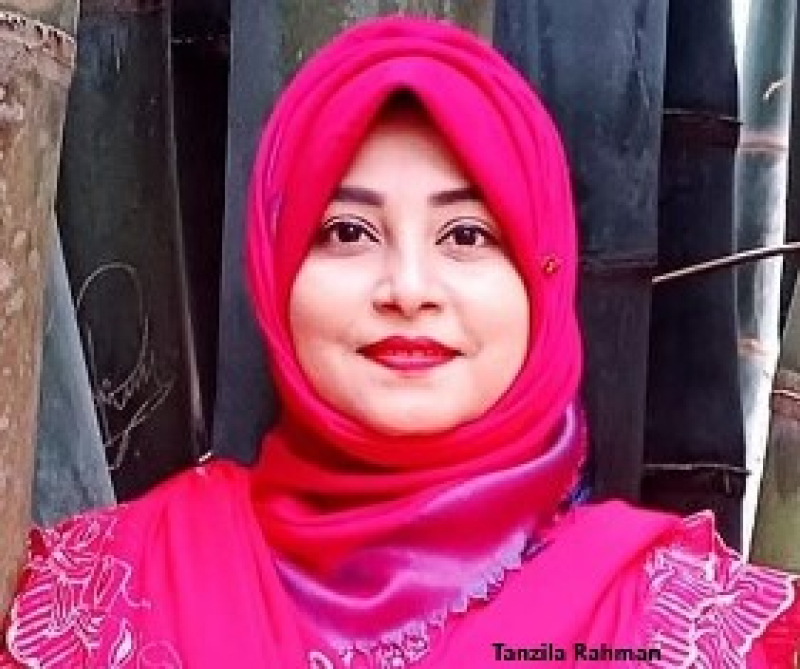- World Bank to Provide $150.75m for Bangladesh RAISE Project |
- Press Secretary Alleges Indian Media, AL Spread Disinformation |
- Hasina Gets 10 Years in Purbachal Plot Corruption Cases |
- NASA Finds Ammonia Compounds on Jupiter Moon Europa |
- Remittance Inflow Surges 45% to $3.17bn in January |
Women in Agrifood System

Tanzila Rahman, UAO, Ramu
Tanzila Rahman and Prof. M Zahidul Haque
Women play an important role in Agrifood system. They are involved in all the processes in the agricultural food chain including production of food plus non-food agricultural products, food storage, post-harvest handling, transportation, processing, distribution, marketing, disposal and consumption. Women sow, grow, harvest and processing, in fact, contribute labor in every phases of producing agrifood from farm to fork!
Prof. M Zahidul Haque
Although women’s contribution in agrifood system is enormous, still, their contributions are not properly recognized by the society. Agrifood systems are a major employer of women in most of the countries of the world. It is a key source of employment for young women. Globally, according to a statistics, 36 percent of working women and 38 percent of men work in agrifood system.
In Bangladesh, women are traditionally involved in various agricultural activities but their involvement in agrifood system is mostly unrecognized.
Women make up 18.3 percent of the workforce in agriculture and agrifood against 22.3 percent of men with small scale farmers in Bangladesh constitutes 58 percent of the agricultural workforce. According to a recent FAO report (2023), more than 65% of women in Sub-Saharan Africa and 70% in South Asia depend on agrifood systems for their livelihoods.
Because of the existing narrow definition of work fails to count the multiple activities women perform on farm and households (mostly unpaid in nature). As a result, women’s crucial roles in agrifood systems are not appropriately estimated in official statistics and datasets. In order to count women’s labor in agrifood systems, an alternative method should be employed considering time used in agrifood systems and other unpaid domestic works by the women.
Women workers are being paid an unequal wage compared to their male counterparts. According to a recent FAO report on the status of women in agrifood systems, women earn around 82 cents for every dollar earned by male workers doing the same job.
The gender wage gaps need to be bridged for ensuring equitable participation of men and women in agriculture and agrifood systems. Women have limited access to resources, education and information, credit and training. There are the lack of technologies exclusively designed for women; women are subjected to work with technologies designed for men.
It may be mentioned here that the USAID has launched a new commitment called “Generating Resilience and Opportunities for Women (GROW)” towards ensuring gender equity and women’s empowerment in water and food security program. At the same time, USAID’s “Feed the Future’ is also contributing one-third of the $1 billion invested annually to efforts that directly contribute to women’s economic empowerment. There is no doubt that these initiatives would definitely help women strengthening their participation in agrifood systems more productively.
If gender inequalities in agrifood systems is reduced and empowering of women could be done, the World will greatly relieved of the pressure of hunger and poverty in both rural and urban settings which will ultimately boost economy, build resilience to shocks due to climate change and other extra-ordinary natural situation like COVID-19 pandemic.
Women must get them prepared through government assistance in terms of easy-credit, training, etc. to get involved as entrepreneurs and independent farmers. Presently, the agricultural universities in Bangladesh including the Sher-e-Bangla Agricultural University are producing a huge number of woman agri-graduates, some of whom can, instead of joining to jobs may take up their profession as agriculture and agrifood systems entrepreneurs for pursuing agri-business.
(Tanzila Rahman (BCS-Agri) is Upazila Agriculture Officer, Ramu, Cox’s Bazar and Prof. M Zahidul Haque retired Professor and was also a former Dean of Faculty of
Agriculture at Sher-e-Bangla Agricultural University, Dhaka.)

